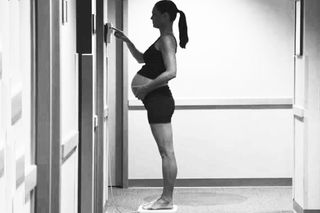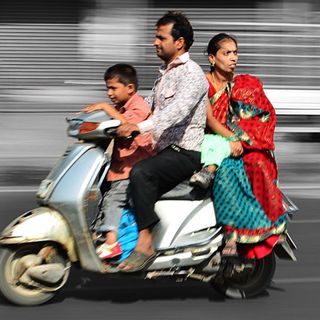
Weight‑Shaming Pregnant Women Affects Their Mental and Physical Well‑Being
Pregnant and postpartum women experiencing weight-related stigma are at risk for depressive symptoms, unhealthy eating behaviors, and stress.

New research has found that pregnant and postpartum women experience weight-related stigma that ultimately ends up affecting their mental and physical health — resulting in stress, depression, or unhealthy eating behaviors.
For the study published in the journal Social Science and Medicine, researchers surveyed pregnant women in their second and third trimesters and those who had given birth in the past year. The researchers asked the women: “Since becoming pregnant, have you ever been treated differently because of your weight or has something or someone made you feel bad or uncomfortable because of your weight?” The women also answered questions based on eating behaviors and levels of depression.
About 65% of the women surveyed answered yes to the primary question. As for the source of stigma, pregnant and postpartum women reported facing questions and comments such as, “You’re too fat to be pregnant,” or “You should put your baby up for adoption because you’re going to make it fat,” and, “When is your stomach going to go back to normal?” The commentary came mostly from the general public/media, followed by strangers, and family members. Even health care providers didn’t spare them, the women reported.
Related on The Swaddle:
Media Depictions of New Moms Make Actual New Moms Feel Bad
These kinds of insulting comments, the current researcher concluded, took a toll on women’s mental and physical health. Researchers noted that the more sources of weight discrimination a woman experienced, the more symptoms of depression she reported. She was also more prone to having more maladaptive dieting behaviors and indulging in emotional eating. The study also stated that no matter what the woman’s BMI was before she became pregnant, weight-stigmatizing experiences had an impact on her health and significantly predicted depression, stress, and poor eating behaviors.
“This is a huge problem because these symptoms can not only affect the mother or mother-to-be, but also the child,” Incollingo Rodriguez, one of the authors of the study and an assistant professor of psychology at Worcester Polytechnic Institute, in the U.S., said in a press release. “Studies have shown that stress in pregnancy can lead to cognitive and learning disabilities, impaired health, even behavioral issues in the child. It can also affect the mother-child relationship, making it more difficult for mothers to breastfeed, and impair mother-infant bonding.”
An important first step to prevent women from experiencing this, said Rodriguez, would be for families and friends to realize that their comments related to pregnant women’s bodies can have negative consequences. “Family and friends can make an effort to be accepting of all shapes and sizes, and to shift the prevailing social messaging that associates weight with negative qualities,” Rodriguez said.
Health care providers also have a responsibility to ensure that pregnant and/or new mothers aren’t made to feel bad about their bodies. “Strictly following traditional weight rules based on body mass index (BMI) for pregnant and postpartum women can be considered old school,” Rodriguez said. “Doctors have been educated to think like that for years. But, if doctors focused less on the numbers on a scale and more on a patient’s healthy eating and exercise habits, they could have a more positive effect on a patient’s overall health, and on their baby’s health while avoiding potentially stigmatizing their patients.”
And most importantly, the media — which pregnant women also reported as being one of the main sources of weight-related stigma — also has a role to play by minimizing negative portrayals of weight gain during pregnancy, “such as portraying new mothers who have kept on weight postpartum as ‘letting themselves go,’ or highlighting how quickly celebrity mothers, like supermodel Gisele Bundchen, have ‘lost the baby weight’ postpartum,” the authors suggested in the press release. “Altering its message to one that is more positive about body image, and one that raises awareness about the damaging effects weight stigma has on pregnant and postpartum women can help spark a much-needed culture shift.”
Anubhuti Matta is an associate editor with The Swaddle. When not at work, she's busy pursuing kathak, reading books on and by women in the Middle East or making dresses out of Indian prints.
Related


Why Do We Follow Some Rules and Break Others?
